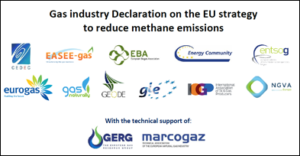October 14, 2020
Methane emissions management and reduction is among the European gas industry top priorities and operators remain more than ever committed to deliver EU Green Deals’ objective. Today Gas Infrastructure Europe (GIE), together with 12 other associations collectively expressed their support to the European Commission’s Strategy on methane emissions via a joint declaration.

For many years, gas operators have successfully been working to reduce methane emissions through mandatory and voluntary programmes. They stand ready to offer their expertise and remains determined to drastically minimise emissions along the entire gas value chain via stronger steps.
We welcome the Methane Strategy’s holistic approach to better exploit the synergies between sectors thereby helping to avoid emissions (e.g. injection of biomethane – produced from manure and waste – into the European gas grids).
To achieve a sustainable and cost-effective reduction of methane emissions, here are 10 principles and elements that should be taken in consideration while designing and deploying methane mitigation tools:
Francisco de la Flor, GIE board member, stated: “This communication represents a quite relevant milestone to address the methane emissions issue in the European Union. GIE and MARCOGAZ have been intensively and closely working with the Authorities and other stakeholders to contribute to the raise of the awareness among the industry players, sharing the expertise and experiences of the members and participating in the open initiatives and consultation processes to allow this expertise to be taken into account to properly achieve the emissions reductions.”
Discover the full gas industry declaration here.
Gas Infrastructure Europe (GIE) is the association representing the interests of European gas infrastructure operators active in gas transmission, gas storage and Liquefied Natural Gas (LNG) regasification. GIE is a trusted partner of European institutions, regulatory bodies and industry stakeholders. It is based in Brussels, the heart of European policymaking. GIE currently represents 70 member companies from 26 countries. GIE’s vision is that by 2050, the gas infrastructure will be the backbone of the new innovative energy system, allowing European citizens to benefit from a secure, efficient and sustainable energy supply.
Downloads
Press contact:
Gabrielle Lelievre
Communication Advisor
T +32 478 78 34 83
gabrielle.lelievre@gie.eu















































